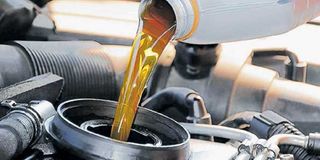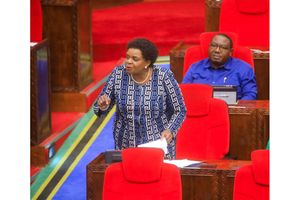Ewura faces tough battle against influx of fake lubricants

Lubricant being poured into a car engine. PHOTO|FILE
Dar es Salaam. As 2018 draws to a close, the Energy and Water Utilities Regulatory Authority (Ewura) boasts of having succeeded in combating oil adulteration.
But inferior lubricants flood the market. Ewura raised kerosene prices almost to the same levels as those of petrol to curb adulteration of oil.
“People no longer complain about the availability of adulterated fuels in the market. This clearly shows we have won the war,” Ewura public relations manager Titus Kaguo told BusinessWeek.
According to petroleum and mechanical engineers, adulteration is the process of deliberate mixing petrol with kerosene, diesel, naphtha, and other chemical solvents which are available at lower prices than those of other fuels.
Automobiles Association of Tanzania information official Athman Hamis warns that oil adulteration reduces the lifespan of vehicles.
He was speaking during a recent international exhibition.
Mr Kaguo says Kenya and Uganda has emulated Tanzania in tackling oil adulteration.
Recently, the New Vision reported that Uganda National Bureau of Standards had been working with the Ministry of Energy and Minerals Development to harmonise prices of all forms of fuel to fight adulteration.
In July, Daily Nation reported that fuel adulteration cost Kenya at least Ksh34 billion.
To tackle the challenge, Kenya has raised kerosene prices.
Tracto Co Limited manager Victor Ndamgoba cites the company’s recent study findings that show the harmonisation of oil prices has reduced the tendency of fuel dealers to mix petrol with other types of fuels and solvents for superprofits.
“In our recent study we have found that the rate of petrol adulteration was higher in the past years when kerosene prices were lower than now. We have beaten Zambia in this regard,” said Mr Ndamgoba.
Tracto Co Ltd is the official distributor for cummins Filtration (Fleetguard) and Pall in Tanzania.
However, Mr Kaguo speaks about a daunting task to fight thousands of informal distributors of fake lubricants. Techniques of fighting the menace include registering importers of lubricants regularly and licensing dealers, producers and distributors.
Ewura says Tanzania produces 20 million litres of lubricants annually while demand is 30 million litres. The deficit is bridged by imports.
Meanwhile, Ewura has simplified the process of registering and licensing importers, distributors, dealers and producers of lubricants. That is being done through filling in forms at the regulator’s website.
Ewura is responsible for technical and economic regulation of the electricity, petroleum, natural gas and water sectors in Tanzania pursuant to Cap 414 and sector legislation.
Its functions include licensing, tariff review as well as monitoring performance and standards.




